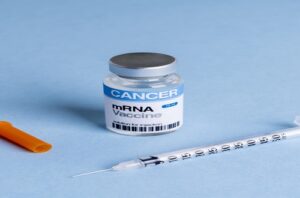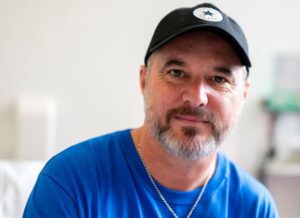An important trial of the world’s first ‘personalized’ mRNA vaccine against the deadliest form of skin cancer – melanoma – is now underway in the UK.
Steve Young, 52, from Stevenage, Herts, who had a melanoma growth excised from his scalp last August, is one of the first patients to try the injection.
It is designed to help his immune system recognize and destroy any remaining cancer cells.
And hopefully, that means his cancer won’t come back.
The shot, mRNA-4157 (V940), uses the same technology as current COVID-19 vaccines and is being tested in final phase III trials.
Doctors at University College London Hospitals (UCLH) give it along with another drug, pembrolizumab or Keytruda, which also helps the immune system kill cancer cells.
Genetic signature
The combination treatment, made by Moderna and Merck Sharp and Dohme (MSD), is not yet commonly available on the NHS outside of clinical trials.

Experts in some other countries, including Australia, are also trying it on patients to gather more evidence and see if it should be rolled out more widely.
The melanoma vaccine is personalized – that is, its composition changes to suit the individual patient.
It is made to match the unique genetic signature of the patient’s tumor. It works by instructing the body to make proteins or antibodies that attack markers or antigens found only on those cancer cells.
‘Custom production’
UCLH investigator Dr Heather Shaw said the jab has the potential to cure people with melanoma and is being tested on other cancers – lung, bladder and kidney tumours.
According to her statement, this occurrence is among the most captivating phenomena witnessed in a considerable duration.
The treatment is specifically customized for each individual patient, as it cannot be administered to subsequent patients due to the lack of anticipated efficacy.
“It’s really personalized.
“These things are hugely technical and finely crafted for the patient.
‘Really Excited’
The UK arm of the international trial aims to recruit at least 60-70 patients across eight centres, including London, Manchester, Edinburgh and Leeds.
Patients in the study had to have had high-risk melanoma surgically removed within the last 12 weeks to ensure the best outcome. Some of them receive a dummy or a placebo instead of the melanoma vaccine. However, none of them know what they are getting.

Mr Young is receiving treatment in London.
Speaking to BBC Radio 4’s Today Programme, he said: “[The trial] gave me a chance to feel like I was actually doing something to fight a potential invisible enemy.
“The scans showed I was X-ray clear. Obviously, there was still a chance I had cancer cells floating around undetected.
Rather than passively awaiting the outcome, I actively engaged in the process of donning boxing gloves and seeking retribution.
Melanoma symptoms to look for
The musician lumped his scalp for many years before realizing the growth was cancerous. He said the diagnosis was a “massive shock”.
“I literally spent two weeks thinking ‘this is it,'” he said.
“My father succumbed to emphysema at the age of 57, and I had anticipated a shorter lifespan than him.”
Common melanoma symptoms to check for include:
- new abnormal mole
- an existing mole that appears to be growing or changing
- Transition to a prior area of unaffected skin
